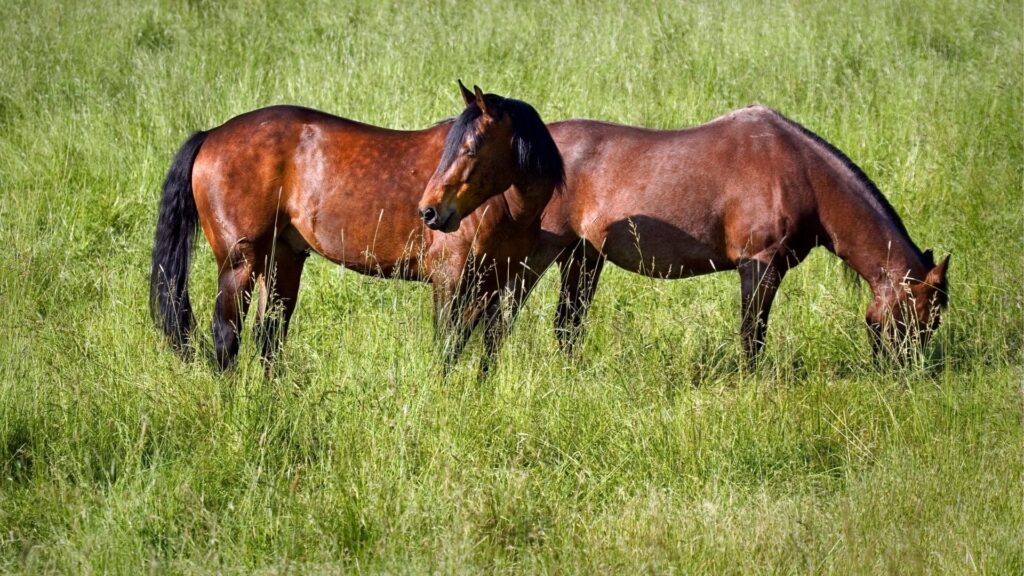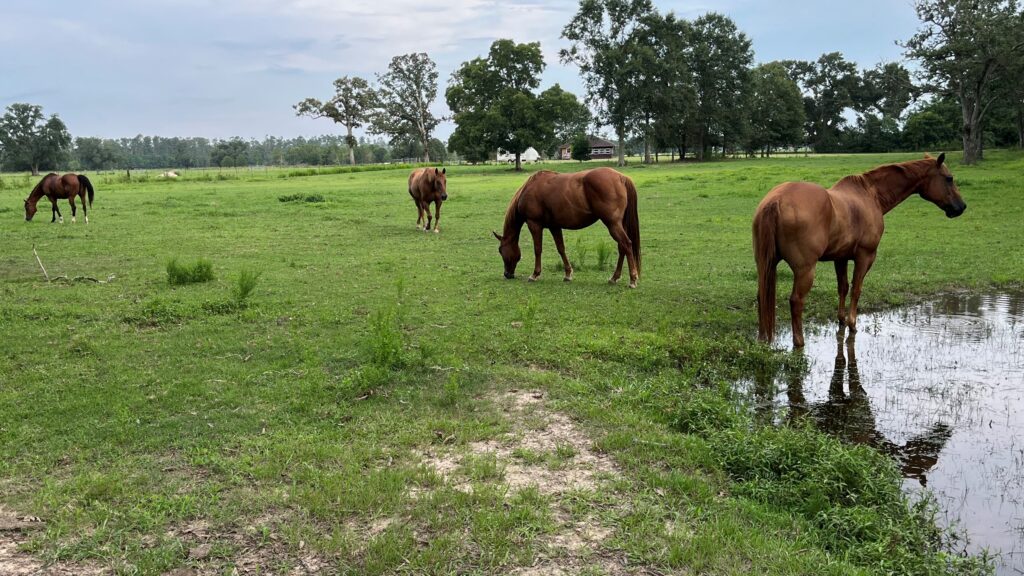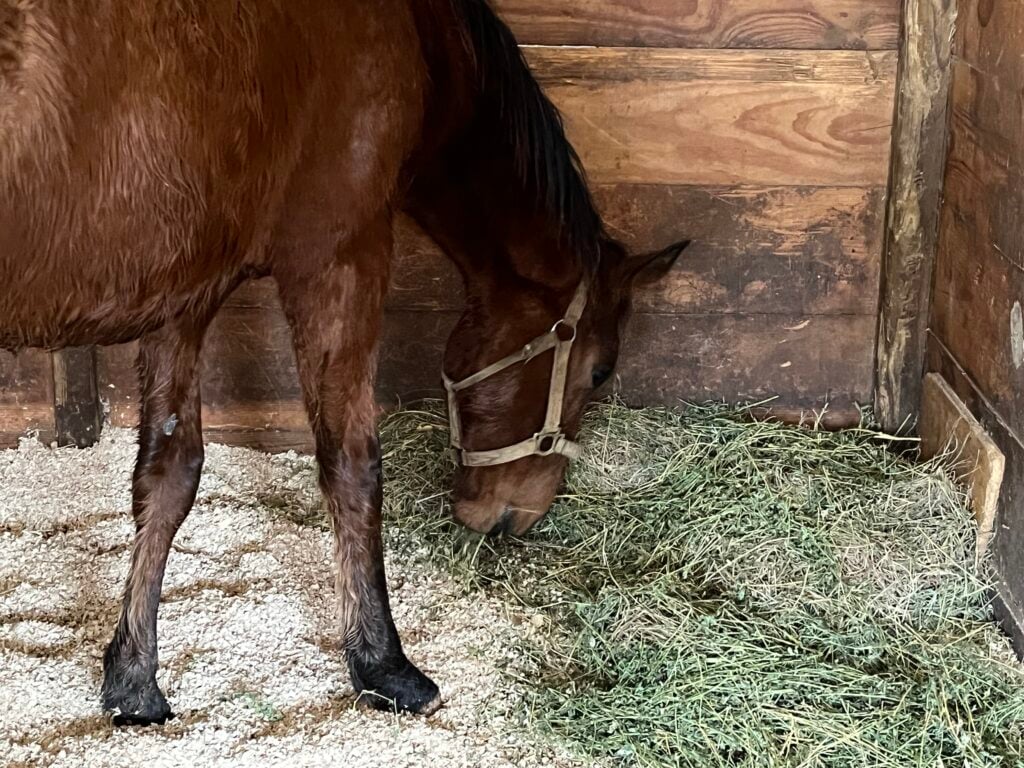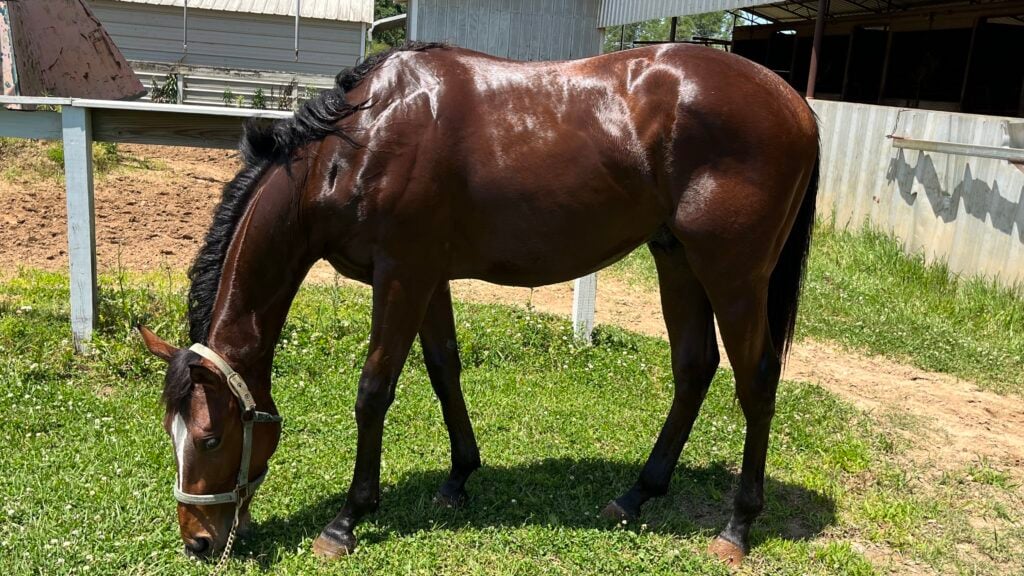What Kind of Grass Do You Need to Feed Horses
Any links on this page that lead to products on Amazon are affiliate links and I earn a commission if you make a purchase. Thanks in advance – I really appreciate it!
Horses thrive in the wild on a diet of grass and other plants. From these foliages, they extract the nutrients needed to grow healthy and strong. Domestic horses are no different; eating grass is essential. But is one type better than another?
Grass is essential to aid horses' digestion and provide the nutrients they need to grow strong and healthy. There are two categories of grasses warm-season and cool-season. Bermudagrass is a quality warm-season grass, and timothy, orchardgrass, and bluegrass are good cool-season grasses.
Horses are herbivores that need a diet high in fiber and low in starch or sugar to maintain their health. Grass provides this and much more. This article examines the importance of grass in horses' diets and the common types of grass they eat.

This article is one in a series I wrote about horses' dietary needs. The previous article, What do Horses Eat? An Equine Nutrition Guide covers the basics you need to know to feed your horse correctly.
Why eating grass is essential for horses.
High-quality grass is optimal for horses.Pasture grass of high quality is the most natural and one of the best foods for a horse.Major horse farms have fine pastures that are well fertilized, drained, and kept free of weeds.
Some horses will do well on pasture alone, and even horses that are confined most of the time should be allowed short periods on grass; not only is young, growing grass high in nutrition, but the horse has a chance to relax and exercise at will. To learn more about horses eating habits, check out this article: Do Horses Need to Eat All the Time?
Horses convert grass into energy and muscle.
Horses need grass to meet their fiber requirements, which helps keep a horse's digestive system healthy. To ensure that your horses are getting enough, veterinarians and nutritionists recommend eating at least 2% of their body weight forage every day.
2% may not sound like a lot, but when a horse weighs 1,200 lbs or more, that's pushing close to twenty-five pounds of forage they eat per day. Horses use this effectively.
They have an amazing single-chamber stomach that can break down cellulose in the grass, releasing nutrients like sugar and protein for them to build strong muscles and use as fuel!
Forages are the supplier of energy and nutrients horses need, but not all forages are the same. The nutritive value and its effect on performance are influenced by the species, forage stage of maturity, and soil fertility.
When considering forage species, it is essential to know that not all of them are the same. For example, legumes, such as alfalfa, are usually higher in protein than bermudagrass. To learn more about how horses convert grass, you should read this article: How Horses Get Strong & Muscular Eating Grass. No Protein?

Types of grass for horses
There are many types of grasses that horses can eat. The different types are broken down into two groups warm-season and cool-season grasses. Warm-season perennial grasses grow during the spring and summer, and cold-weather annual grasses grow during the cool fall and spring months.
Cool-season grasses for horses
| Cool Season Grass | Characteristics |
|---|---|
| Timothy | Easy to grow, thrives in cool, wet regions but doesn't tolerate close grazing well. It produces leafy stems late in the growing season. |
| Orchardgrass | Not tasty grass or one that appeals to finicky horses but can grow in less than desirable soil conditions. |
| Tall fescue | Commonly used in Europe, tall fescue grass has deep roots, does well in low ph soils, and retains its quality during the cool growing season. Because of its deep roots, it can withstand heat and low moisture. |
| Kentucky bluegrass | Kentucky bluegrass can withstand drought and grows well in light, sandy soil. Since it's palatable to horses of all ages, many horse owners like it even though it needs fertilizing more often than usual for optimal growth throughout the year. |
| Perennial ryegrass | Perennial ryegrass is an ideal forage because it can quickly establish high-yielding growth and rapid regrowth after overgrazing. The downside is that it can cause laminitis in some horses because of the water-soluble carbohydrates, including fructan, it produces. |
Warm-season horse grasses.
Warm-season grasses are more efficient at using water than cool-season grasses, but most produce less protein. However, they make a lot of forage because of the efficient use of the soil's nutrients.
| Warm Season Grass | Characteristics |
|---|---|
| Bermudagrass | Bermudagrass is a kind of grass that is grown in the south. It can grow in different places and does well on fertile soil. It produces high yields when it's managed well and has about as much nutrition as orchardgrass or tall fescue. |
| Crabgrass | Crabgrass grows quickly and fills bares spaces. Crabgrass is used for forage in some places, but it grows unevenly and is not desirable as a food source for horses in other areas. |
| Bahiagrass | Bahiagrass is grown in many areas of the south. People like it because it's easy to grow. But I wouldn't say I like it. It's tough, wears down a horse's teeth, and provides little nutritional value. It's much better suited for cows and sheep. |
The best grass for horse pastures includes a mix of both warm and cool-season kinds of grass.

Too much rich grass can cause a horse to founder.
Horse owners can save a good deal of money since hay and grain rations can be cut back if a horse is getting sufficient nutrition from forage. Don't, however, suddenly turn a hay-fed horse out to graze for long periods. Rich grasses can easily founder a horse.
Pasture grass should not be allowed to grow too high or be clipped too short; tall mature grass is less nutritious, and overgrazed land may breed parasites. For that reason, both pasture rotation and fertilization are recommended.
Cattle can improve horse pastures by fertilizing the soil and keeping the grass cropped, allowing the horse to consume the easily digestible and more nutritious young grass.
Properly maintained pastures provide the best nutrition.
Legumes, such as alfalfa and clover, and grasses like Timothy and Kentucky bluegrass, are excellent pasture grasses. However, some grasses may have a laxative effect at certain times of the year.
Horses are most likely to get diarrhea from eating grass when they are turned out after extended stall confinement and are suddenly exposed to a richer diet.
This sudden increase in rich food is troublesome for heavily worked horses but excellent for broodmares and young horses. Temporary pastures of young, growing oats, rye, wheat, or barley can provide a welcome change when the regular fields are dormant.
To learn more about founder in horses, I wrote an article you may find interesting: What Causes a Horse to Founder and Can They Recover From It?

Horses can't eat grass clippings.
You should never give your horse fresh-cut grass because they can eat it too fast without thoroughly chewing, which in turn causes severe health issues. Cut pieces of grass also attract bacteria and mold that will severely affect a horse's stomach when eaten.
I wrote an article all about why horses shouldn't eat grass clippings. If you're interested in learning more about the topic, check it out: Why Can't Horses Eat Cut Grass? Isn't Hay Grass Clippings?
FAQ
What kind of grass is bad for horses?
Don't let your horses eat any of the following: sorghum, sudangrass, johnsongrass, or any varieties of these types. Horses can get sick from eating this grass. That's why horse owners must know what the grass is in their pastures.
Resources:
- Associative effects on total tract digestibility in horses fed different ratios of grass hay and whole oats
- Voluntary intake and digestion of Coastal Bermuda grass hay by yearling and mature horses
Source: https://horseracingsense.com/grass-horses-why-essential-different-types/